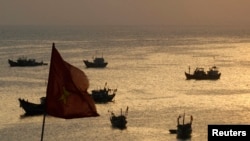Vietnamese Prime Minister Nguyen Tan Dung is pledging to create more favorable working conditions for more than 1 million fishermen who he said play a part in protecting the country's sovereignty in the disputed South China Sea.
In a speech this week, Dung asked relevant ministries to put forward concrete credit policies such as easier access to loans for building better equipped fishing ships.
His remarks come days after a Vietnamese ship was allegedly attacked by an unidentified Chinese ship near the disputed Paracel islands in the South China Sea. Hanoi and Beijing have not officially commented on the incident, which was widely reported in the Vietnamese media.
Vo Van Trac, vice chairman of the Vietnam Fisheries Society, welcomed Dung's remarks. He told VOA that one crucial, urgent issue was providing enough capital for fishing operations.
"If Vietnam wants to defend its territorial sovereignty, its fishermen should maintain their presence at sea. But they need capital resources to carry out long-term fishing in the face of China's threat and prevention. The state should reassure them through policies that put a priority on them," he said.
Fishermen, who often venture out on disputed areas over the South China Sea, told VOA's Vietnamese service they desperately sought private loans from the black market to facilitate their operations and even to pay for fines allegedly imposed by China.
The Vietnamese prime minister mentioned this point in his speech, saying the country should not let its fishermen continue borrowing from loan sharks.'
According to official records, Vietnam has a fleet of nearly 30,000 offshore fishing ships.
Four Southeast Asian countries, Vietnam, Brunei, Malaysia and the Philippines, are locked in territorial disputes with China over waters in the South China Sea.
This report was produced in collaboration with the VOA Vietnamese service.
In a speech this week, Dung asked relevant ministries to put forward concrete credit policies such as easier access to loans for building better equipped fishing ships.
His remarks come days after a Vietnamese ship was allegedly attacked by an unidentified Chinese ship near the disputed Paracel islands in the South China Sea. Hanoi and Beijing have not officially commented on the incident, which was widely reported in the Vietnamese media.
Vo Van Trac, vice chairman of the Vietnam Fisheries Society, welcomed Dung's remarks. He told VOA that one crucial, urgent issue was providing enough capital for fishing operations.
"If Vietnam wants to defend its territorial sovereignty, its fishermen should maintain their presence at sea. But they need capital resources to carry out long-term fishing in the face of China's threat and prevention. The state should reassure them through policies that put a priority on them," he said.
Fishermen, who often venture out on disputed areas over the South China Sea, told VOA's Vietnamese service they desperately sought private loans from the black market to facilitate their operations and even to pay for fines allegedly imposed by China.
The Vietnamese prime minister mentioned this point in his speech, saying the country should not let its fishermen continue borrowing from loan sharks.'
According to official records, Vietnam has a fleet of nearly 30,000 offshore fishing ships.
Four Southeast Asian countries, Vietnam, Brunei, Malaysia and the Philippines, are locked in territorial disputes with China over waters in the South China Sea.
This report was produced in collaboration with the VOA Vietnamese service.





